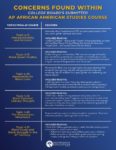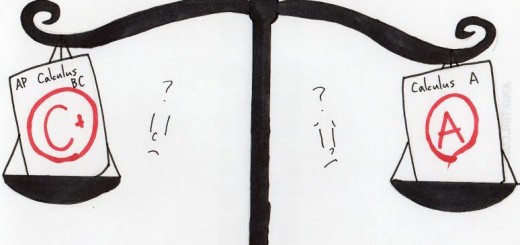Protect AP African American Studies from political pressure
 Ash Chang | Conant Crier
Ash Chang | Conant Crier When Americans think of what defines American culture, many associate the idea with patriotic recollections of Fourth of July barbecues and fireworks, jazz music, and Hollywood. Though we may take these things for granted, without the contributions of the historically marginalized African Americans, the country wouldn’t have been blessed with societal gifts such as new music genres, civil rights legislation, and significant contributions in science and the arts.
Adding to its 38 course offerings over multiple disciplines, College Board is piloting an AP African American studies course that will allow students to explore the contributions of African Americans in the growth and development of the US and their influence on American culture throughout the nation’s history. The curriculum will cover a wide range of topics divided into four units: “Origins of the African Diaspora,” “Freedom, Enslavement and Resistance,” “The Practice of Freedom,” and “Movements and Debates.”
The Crier strongly supports and urges the implementation of AP African American Studies into the Conant and District 211 curriculum once the course becomes available.
The course is currently in development and is being piloted in 60 high schools across the country this school year. College Board recently released a revised course framework on Feb 1, the first day of Black History Month. During December 2022, College Board’s AP Program consulted over 300 professors of African American Studies from more than 200 colleges and high school teachers from around the nation to provide feedback on the preliminary pilot course framework. The official framework will include new topics, highlight primary sources, and require a student research project that will count as the part of the AP exam score. According to College Board, “A new AP course can only launch if colleges and universities commit to awarding college credit and placement to students who achieve qualifying AP Exam scores.” Currently, more than 200 institutions have committed to granting college credit and placement in support of the course.
The implementation of AP African American studies will have significant educational value for students at Conant. Ethnic studies classes give students of color the opportunity to see themselves and their heritage reflected in the curriculum they are learning, promoting a sense of belonging at school. In fact, according to a study by scholars at the Stanford Graduate School of Education, ethnic studies classes boost attendance and academic performance.
In addition, learning about other cultures and the experiences of other races and ethnic groups fosters racial and cultural awareness that helps students to appreciate cultural diversity in the student body. Respecting and valuing the similarities and differences among peers cultivates empathy and nurtures a more harmonious community and social environment. Students will develop a better understanding of their classmates and gain insight into the racial and socioeconomic inequities that continue to impact American society.
However, the course has met some fierce resistance from Florida Governor Ron DeSantis, who is notorious for his highly-conservative policies and attempts at academic censorship. DeSantis, along with several other Florida officials, claimed that the course is “woke indoctrination masquerading as education.” The course offers valuable information and learning skills for students, yet Florida officials were appalled at the several topics in the curriculum, including Black Queer Theory and Critical Race Theory, deeming it an effort to push an agenda on students in Florida.
DeSantis’s claims and opposition towards the course is hardly a surprise, given the state’s past laws and the governor’s public statements. From the “Stop WOKE act”, which prohibits schools from teaching curriculum that depicts people as marginalized based on their race, to the “Parental Rights in Education” bill, commonly known as the “Don’t Say Gay” bill, which limits classroom discussion of gender identity and sexual orientation, the state has had its fair share of bigotry and homophobic sentiment.
However, this obsession over extinguishing “woke” values is simply shutting down and silencing the voices, culture, and history of a population that played an integral role in American history and development. Deeming the course as devoid of educational value raises questionable standards and alludes to racist intentions, especially if and when other courses like AP European History are allowed to run. AP African American studies will raise awareness of African American culture and provide students with context to the systemic racism we are combating today.
Florida legislators’ fixation on suppressing ideas like the Critical Race Theory or queer studies
 Image from Manny Díaz Jr on Twitter
Image from Manny Díaz Jr on Twitter Florida State Senator Manny Díaz, Jr. lists concerns with the AP African American course.
has hindered their ability to realize that the course is trying to teach African American studies through multiple perspectives and highlight the diversity and complexity of black history, cultures, and perspectives.
Attempting to censor what students can and cannot learn in the classroom is simply irrational. Students should be able to think critically and establish their own opinions, and the point of school isn’t to tell students what they can believe or guard them from the real world. Suppressing the curiosity of students only hinders their development as learners. Disagreement and debate, especially in the context of the classroom, allows students to explore complexities of various topics and learn to consider multiple viewpoints.
Offering ethnic studies courses such as AP African American Studies is a firm step in the right direction of nurturing a generation that is politically and socially aware. College Board and the administration of D211 and Conant High School cannot waver or cower to politics. It is unequivocally necessary for Americans to protect and advocate for comprehensive and unbiased education – one that shows the good, the bad, and the truth – so that we can learn from the past and shape the present and future to the ethical and equitable world we are striving to achieve.




Recent Comments